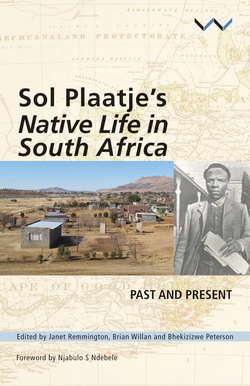Читать книгу Sol Plaatje's Native Life in South Africa - Jacob Dlamini - Страница 12
На сайте Литреса книга снята с продажи.
Plaatje, the African intelligentsia and South Africa's cultural landscape
ОглавлениеPlaatje's generation faced many challenges in engaging in social advocacy and intellectual work. The mission-educated African intelligentsia was a small group, occupying a precarious social and economic position – attested to by the perilous state of Plaatje's finances throughout his life. The poet and academic B W Vilakazi, a generation or so younger than Plaatje, decried the poverty, squalor, and deeply alienating circumstances in which members of his group had to live. Owing to a ‘lack of privacy’ and ‘haunted constantly by disturbing elements and fear’, Vilakazi concluded that ‘no Bantu Madonna will be painted in our locations, no Bantu Keats or Milton will come from them’.35 D D T Jabavu, the first black professor at the South African Native College (founded in the same year as Native Life was published, later renamed the University of Fort Hare), advised teachers to ‘move heaven and earth’ in order to get ‘a room that you can regard as private to yourself for meditation and reading’.36 Even in beating the odds to gain an education, the African intelligentsia had to circumvent a range of institutional exclusions. H I E Dhlomo noted, in an overview bemoaning the biased ethnocentric history penned by white scholars, that research by blacks was hampered: ‘Natives cannot get access into public and state libraries and into the archives departments.’37 Apart from publishing in newspapers, there were very few outlets for their writings. Black intellectuals faced limited resources and their marginal status made the production, circulation and reception of their contributions significantly harder than for their white counterparts.
The writing of Native Life signals the aspirations and needs of the African intelligentsia to assert their humanity, modern citizenship and agency. Their texts – in all their ideological diversity and differences in craftsmanship – represent, in the first instance, a significant body of knowledge that in itself constitutes an immeasurable archive. Its marginalisation and even omission from the institutions and canons of South Africa's knowledge systems is not a reflection of its quality or relevance, but of the Eurocentric and ethnocentric premises that have informed social, cultural and educational life – and continue to do so. The presence of this textual archive should be acknowledged in relation to cultural and educational life, not as nationalist doctrine, but as reflection on the messiness of South Africa's heritage. Once the archive is more fully recuperated, it will be best approached with a deep appreciation of the historical, political, economic and ideological conditions of its emergence and goals. This will require the same and different examples of the generosity of spirit evident in Ndebele's reading strategies.
Plaatje, his generation and their works are important for other reasons. They held in high regard the labours, significance and pleasures of creative and intellectual work. Despite unconducive social conditions, they led multifaceted and purpose-driven lives, challenging us to evaluate what we aspire to in leadership and public intellectual roles today. Many were extraordinarily adept across fields and endeavours spanning journalism, politics, education, languages and the arts. Their works grappled incisively with race and class, democracy and authority (whether traditional or modern), power and gender, culture and identity. Inasmuch as they were critical of aspects of traditional culture and authority, they were also appreciative of their meanings and roles in the past and the present. Regarding the politics of race, Plaatje and his peers produced alternative visions that strengthened African senses of self. These affirmations were simultaneously local and particular, while remaining cognisant of and receptive to the rest of the world. Although their encounters with other races and cultures were sharply brokered through the racism, violence and exclusions of colonialism and imperialism, they affirmed a belief in a common humanity. These are all concerns that continue to animate public life in South Africa and much can be gained by revisiting black South Africans' articulations from the past.
Many of the sociopolitical and economic conditions that hindered Plaatje's creative and intellectual life continue to lie behind the conflicts that affect the tertiary education sector today, and the calls for its transformation. Important institutional challenges include racial imbalances in the composition of academic staff, and curricula with content overwhelmingly skewed towards canonical texts drawn from Europe and North America. Exclusionary practices and inhospitable surroundings have typified many campuses, where the institutional culture has led to the alienation, conflict and subsequent departure of black academics and professionals.38 Improvement of the lived experiences of black staff and students is a key part of the changes that are being called for. There is also what may be termed the monolingual nature of teaching and knowledge production. The dominance of English across disciplines and the inability or limited abilities to speak or write in African languages by scholars across the racial divides means that the experiences, views and insights of the majority of citizens have not been meaningfully engaged with and brought into the orbit of education and pedagogy.
